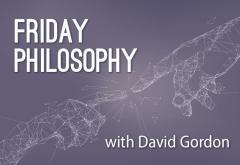
Economic experts typically focus on narrow technical specializeds. In doing so, they sometimes fall into philosophical errors, because they uncritically consider given assumptions that are philosophically mistaken or a minimum of questionable.
The most typical instance of this is familiar. Many economists presume that normative judgments, instead of detailed ones, are subjective. It makes no sense, they think, to claim that our ethical judgments are true or false. “The demand curve slopes downward to the right” holds true, but “eliminating the innocent is wrong” is not, even though lots of people accept this judgment. Not that these economists think “killing the innocent” is false: it’s simply that reality and falsity are the incorrect predicates to utilize when evaluating value judgments.
I’m not going to argue against this position here, though I think it’s mistaken. The point I wish to tension is various. The economic experts who hold this view do not realize that it’s questionable and requires to be supported by argument. They think that “everybody” knows that normative judgments are subjective and that they are simply reminding us of something obvious when they state it. Had they looked at the philosophical literature, they would have quickly discovered that many philosophers reject their view and defend ethical objectivity, on different premises. It’s not that no one defends the subjectivist view; rather the contrary. But since they do not understand the state of play in viewpoint, the economists I want blithely continue unawares. To avert a misconception, what is at concern here is not that in describing human action, economic experts properly use the subjective preferences individuals hold. That is not a normative question.
The economic expert Deirdre McCloskey is not a narrow technical expert. She has read widely in history, literature, and approach. Regrettably, she shows another failing, various from that of the narrow technical specialists I have actually simply slammed. She does not comprehend modern viewpoint well, regardless of the variety of her reading.
I wish to show this problem from her widely known book, Knowledge and Persuasion in Economics (Cambridge University Press, 1994). She mentions this book in her just recently published Bettering Humanomics (University of Chicago Press, 2021) therefore far as I am aware, she has not changed her viewpoint about the problems I’ll be discussing. In the earlier book, she says:
Similarly, “reality” is not to be figured out merely by kicking stones or knocking tables. That a reality is a fact relative only to a conceptual plan is no longer questionable, if it ever was. Kant knew it. So must we. Studies of science over the previous few decades have actually shown consistently that realities are built by words. There is nothing outrageous in this logic and truth of scientific rhetoric. (p. 41)
McCloskey states that it’s no longer controversial that a fact is a fact relative only to a conceptual plan; however one of the most famous papers in analytic viewpoint in the past fifty years is Donald Davidson’s “On the Extremely Idea of a Conceptual Plan,” which turns down the entire idea. Davidson states,
Philosophers of many persuasions are vulnerable to broach conceptual plans. Conceptual plans, we are told, are methods of arranging experience: they are perspectives from which individuals, cultures, or periods survey the passing scene … Truth itself is relative to a plan: what counts as genuine in one system may not in another … Conceptual relativism is a heady and exotic doctrine, or would be if we could make good sense of it. The difficulty is, as so often in approach, it is hard to enhance intelligibility while keeping the enjoyment. At any rate that is what I shall argue. (p. 5)
At the end of his post, Davidson sums up his argument in this method:
In giving up reliance on the concept of an uninterpreted reality, something outside all schemes and science, we do not give up the notion of unbiased truth– rather the contrary. Provided the dogma of a dualism of plan and reality, we get conceptual relativity, and fact relative to a plan. Without the dogma, this kind of relativity goes by the board. Of course fact of sentences stays relative to language, but that is as unbiased as can be. In giving up the dualism of scheme and world, we do not give up the world, but re-establish unmediated touch with the familiar things whose antics make our sentences and opinions real or false. (p. 20)
My problem isn’t that McCloskey disagrees with Davidson; it is that she is uninformed of what is going on in the field she’s discussing therefore manifests her own ignorance. It is as if a financial expert were to state, “It’s no longer controversial that if there is an economic downturn, the government needs to spend enormously on public works.”
Things are even worse. In her book, McCloskey makes clear that she admires and concurs with the philosopher Richard Rorty, and he is a primary source for her conceptual relativism. She says, for instance, that “as Richard Rorty and others have kept in mind, ‘The world is out there, however descriptions of truth are not'” (p. 200).
McCloskey does not recognize that one of the essential styles in Rorty’s approach is his rejection of the scheme-content distinction. In Viewpoint and the Mirror of Nature (Princeton, 1981), Rorty states that the dualism of plan and content is “a dogma which … is main to epistemology in general and empiricism in specific” (p. 259). To be sure, Rorty takes his rejection of the scheme-content difference in a relativist method, as Davidson does not, and this might have confused McCloskey.

